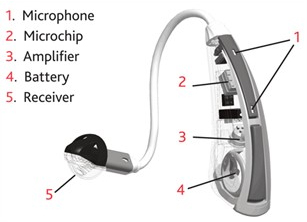 Facilites
Facilites
 Digital Hearing Aid
Digital Hearing Aid

 Therapy Facilities
Therapy Facilities
- Speech Therapy
- Language Therapy
- Cognition Therapy
- Occupational Therapy
- Behaviors Modifications
- Special Education
- Dietary Intervention
- Vestibular Rehabilitation
- Auditory Verbal Therapy for Hearing Impaired
A digital hearing Aid is a device that receives sound and digitizes it (breaks sound waves up into very small discrete units) prior to amplification. Device that increases the loudness of sounds in the user’s ear. Its principal components are microphone & amplifier. Hearing aids with automatic volume control very the amplification automatically with the input.
Hearing Aids are available with two types of technology: Analogue Hearing Aid and Digital Hearing Aid.
Analogue hearing aids, which are not often used now, will pick up the sound, translate it into an electrical signal, amplify it, and then feed it into the ear.
Some analogue hearing aids can detect whether sounds are loud or quiet and therefore whether they need to be amplified or not. This means that they will recognise that loud sounds, such as traffic, do not need further amplification. This feature is known as "automatic gain control".
A Digital hearing aid, on the other hand, is much more advanced than an analogue aid. It contains a silicon chip comprising millions of electrical components that continuously process incoming sound, convert it into clearer and more audible sounds and then release these at the appropriate sound level into the ear. Its sophistication allows it to distinguish between sounds that need to be amplified and unwanted noise that needs to be reduced. This differentiation allows wearers to distinguish similar sounding speech sounds much more clearly.
Because they are much more advanced, digital hearing aids can be adapted to work with an individual's personal degree of hearing loss and lifestyle needs. They have a number of pre-set programs which can be used in different situations, such as quiet conversations, concerts, or at parties where there is a great deal of background noise.
The more sophisticated digital aids enable the user to watch the TV while taking part in conversations, locate where sounds are coming from, eliminate whistling and feedback while on the phone or hugging someone, and can link up via wireless technology to the TV, mobile phone, computer or stereo system.
Hearing Aid Companies





The parts of a hearing aid
There are different types of hearing aid, but they all have the same five key components:
The microphone on the outside of the hearing aid picks up sound from the air as it enters the ear and converts sound waves into digital signals
The amplifier strengthens the digital signals
The speaker converts the digital signals into vibrations that then pass through the inner ear to the brain
A tiny battery powers the hearing aid
A microchip - a miniature computer that helps us tune and personalise your hearing aid to your individual needs

How Hearing Aids Work
Hearing aids are tiny electronic devices that sit in or behind your ear. Hearing aids receive sound, process and amplify it, and deliver it right into your inner ear, where it is sent to the brain.
When a person speaks, the hearing aid microphone picks up the sound to convert it into electrical signals
The hearing aid amplifier increases the strength of the electrical signal
The hearing aid receiver/speaker converts the electrical signal back into sound and sends it to the inner ear
The brain “hears” and understands the sound as speech
Hearing aids are sophisticated, state-of-the-art instruments with many different features and benefits. The appropriate style for you depends on your level of hearing loss, lifestyle and budget.
How to know if you are losing your hearing?
If you experience any of these situations, you may have hearing loss:
Others seem to mumble rather than speak clearly to you?
People often have to repeat things for you before you understand what they say?
You have difficulty understanding what is being said in noisy places, such as pubs or restaurants, even though other people manage to have conversations?
You find it hard to keep up with conversations when talking to a group of people?
You find it tiring to listen to conversations because you have to concentrate hard?
Others think your television or music is too loud but you cannot hear it properly if they turn it down?
You often have difficulty hearing on the telephone?
All Right Reserved © 2017
Designed and Developed by Info Era Software Services Pvt. Ltd.
